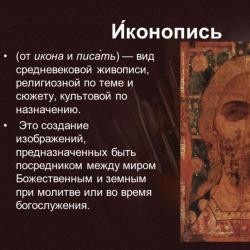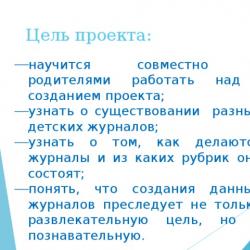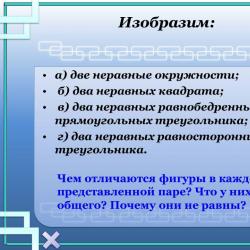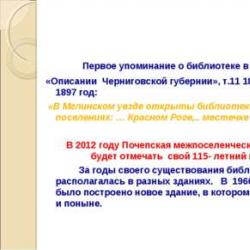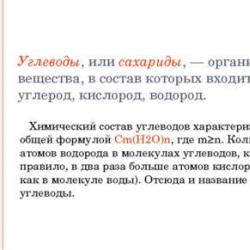Presentation on the theme "the best library". Presentation on the topic “History and activities of the Irdanovskaya rural library Presentation report on the best rural library
slide 2
“Let the winds of change blow in the world, But the library will live forever, And oblivion and decay will not touch books…” Reading room Subscription Acquisition and processing department Legal information cabinet Methodological departmentslide 3
 The first mention of the library in the "Description of the Chernihiv province", v.11 1899, p.377. 1897: “In the Mglinsky district, libraries were opened in the following settlements: ... Krasny Rog, .. the town of Pochep.” In 2012, the Pochep inter-settlement library will celebrate its 115th anniversary. Over the years of its existence, the library has been located in different buildings. In 1966, a new building was built for her, in which she is still located.
The first mention of the library in the "Description of the Chernihiv province", v.11 1899, p.377. 1897: “In the Mglinsky district, libraries were opened in the following settlements: ... Krasny Rog, .. the town of Pochep.” In 2012, the Pochep inter-settlement library will celebrate its 115th anniversary. Over the years of its existence, the library has been located in different buildings. In 1966, a new building was built for her, in which she is still located.
slide 4
 The place is historical. In the 19th century, the palace of Count Kirill Razumovsky towered here, in which the richest library was collected. Aleksey Mikhailovich Zhemchuzhnikov, the cousin of A.K. Tolstoy, was born here, one of the creators of the image of Kozma Prutkov, a poet who left in Russian literature “a trace of a sublime dream, and sincere sorrow, and human thought.” The library has a plaque commemorating this event. Palace of Kirill Razumovsky. .G. Pochep Intersettlement Library of Pochep, 2011
The place is historical. In the 19th century, the palace of Count Kirill Razumovsky towered here, in which the richest library was collected. Aleksey Mikhailovich Zhemchuzhnikov, the cousin of A.K. Tolstoy, was born here, one of the creators of the image of Kozma Prutkov, a poet who left in Russian literature “a trace of a sublime dream, and sincere sorrow, and human thought.” The library has a plaque commemorating this event. Palace of Kirill Razumovsky. .G. Pochep Intersettlement Library of Pochep, 2011
slide 5
 At all stages of its development, the library has carried out and continues to carry out an important educational mission; it is constantly at the center of public life. The main mission of the library is to create a convenient, comfortable space for reading, communication, education, the development of information culture, as well as the spiritual and cultural development of the individual. Goals and objectives of the library: Promotion of books and reading in accordance with the goals and objectives of the “National Program for the Support and Development of Reading; Organization of exhibitions, information materials on the activities of government bodies and the implementation of national projects in the country, region, district; Collection and provision of various kinds of information for the population of the municipal district. Information support in the formation of local self-government; Educational work to help legal, environmental, patriotic education Local history activities. Propaganda of books and libraries Research work within the framework of the library program "Study, promotion of the life and work of the Russian poet and playwright A.K. Tolstoy"; Creation of comfortable conditions for communication, leisure activities in the library;
At all stages of its development, the library has carried out and continues to carry out an important educational mission; it is constantly at the center of public life. The main mission of the library is to create a convenient, comfortable space for reading, communication, education, the development of information culture, as well as the spiritual and cultural development of the individual. Goals and objectives of the library: Promotion of books and reading in accordance with the goals and objectives of the “National Program for the Support and Development of Reading; Organization of exhibitions, information materials on the activities of government bodies and the implementation of national projects in the country, region, district; Collection and provision of various kinds of information for the population of the municipal district. Information support in the formation of local self-government; Educational work to help legal, environmental, patriotic education Local history activities. Propaganda of books and libraries Research work within the framework of the library program "Study, promotion of the life and work of the Russian poet and playwright A.K. Tolstoy"; Creation of comfortable conditions for communication, leisure activities in the library;
slide 6
 Folk wisdom says: “One book teaches a thousand people” “From time immemorial, a book raises a person” “A mind without a book is like a bird without wings” This is the motto of our library. The library has a huge wealth. It has 53648 copies of various publications. 3844 users are served annually, who are issued about 80 thousand copies of various documents. . The library is the custodian and propagandist of the book. And in the books the wisdom of centuries, the experience of generations, dreams of the future. With the book we find the way to the heart, soul, good way to each of our readers. In this, our social partners provide us with an invaluable service:
Folk wisdom says: “One book teaches a thousand people” “From time immemorial, a book raises a person” “A mind without a book is like a bird without wings” This is the motto of our library. The library has a huge wealth. It has 53648 copies of various publications. 3844 users are served annually, who are issued about 80 thousand copies of various documents. . The library is the custodian and propagandist of the book. And in the books the wisdom of centuries, the experience of generations, dreams of the future. With the book we find the way to the heart, soul, good way to each of our readers. In this, our social partners provide us with an invaluable service:
Slide 7

Slide 8
 We promote the book through various forms of reader service. The doors to the library are open to everyone.
We promote the book through various forms of reader service. The doors to the library are open to everyone.
Slide 9
 One of the main areas of work is patriotic education. Together with all of Russia, the people of Pochep went down the thorny path of the Great Patriotic War. The Pochep partisan detachment named after Furmanov, numbering up to 400 people's avengers in its ranks, did not give rest day or night. Seven glorious sons of the Pochep land were awarded the title of Hero of the Soviet Union. The glorious fighting traditions were continued by the sons and grandsons, performing their civic duty in Afghanistan in the North Caucasus. Our task is through books, meetings with veterans and combatants, participation in regional events to convey the concept and awareness of the involvement of everyone present in understanding the essence of the phenomenon of "war"
One of the main areas of work is patriotic education. Together with all of Russia, the people of Pochep went down the thorny path of the Great Patriotic War. The Pochep partisan detachment named after Furmanov, numbering up to 400 people's avengers in its ranks, did not give rest day or night. Seven glorious sons of the Pochep land were awarded the title of Hero of the Soviet Union. The glorious fighting traditions were continued by the sons and grandsons, performing their civic duty in Afghanistan in the North Caucasus. Our task is through books, meetings with veterans and combatants, participation in regional events to convey the concept and awareness of the involvement of everyone present in understanding the essence of the phenomenon of "war"
slide 10
 The children's memory book is a family work of our young readers, their parents, grandparents. The presentation of the exhibition "Holy Memory of the War" took place on the central square of Pochepa. It traditionally gathers around itself the inhabitants of the city and the region, because. It contains rich local history material.
The children's memory book is a family work of our young readers, their parents, grandparents. The presentation of the exhibition "Holy Memory of the War" took place on the central square of Pochepa. It traditionally gathers around itself the inhabitants of the city and the region, because. It contains rich local history material.
slide 11

slide 12
 On the occasion of the 25th anniversary of the accident at the Chernobyl nuclear power plant, an information day “Chernobyl: 25 years later” was held in the inter-settlement library, to which participants in the liquidation of the accident living in the Pochepsky district were invited. The library took part in the regional virtual scientific and practical conference dedicated to the 25th anniversary of the accident at the Chernobyl nuclear power plant (Maslenko S.M., "The work of libraries to help the social adaptation of the liquidators of the accident at the Chernobyl nuclear power plant").
On the occasion of the 25th anniversary of the accident at the Chernobyl nuclear power plant, an information day “Chernobyl: 25 years later” was held in the inter-settlement library, to which participants in the liquidation of the accident living in the Pochepsky district were invited. The library took part in the regional virtual scientific and practical conference dedicated to the 25th anniversary of the accident at the Chernobyl nuclear power plant (Maslenko S.M., "The work of libraries to help the social adaptation of the liquidators of the accident at the Chernobyl nuclear power plant").
slide 13
 Research work The brochure "Holy Memory of the War" is a collective work of librarians of the Pochepsky district, it contains all the information about the monuments of the war located on the territory of the Pochepsky district.
Research work The brochure "Holy Memory of the War" is a collective work of librarians of the Pochepsky district, it contains all the information about the monuments of the war located on the territory of the Pochepsky district.
slide 14
 The library initiated a round table on the topic "Preservation and development of cultural traditions of the Pochep region." The round table brought together a variety of representatives of the public, clubs, associations, leaders, local historians, and invited the leadership of the district to participate. The result of the event is the need for a programmatic, targeted solution to the problems of preserving and developing cultural heritage.
The library initiated a round table on the topic "Preservation and development of cultural traditions of the Pochep region." The round table brought together a variety of representatives of the public, clubs, associations, leaders, local historians, and invited the leadership of the district to participate. The result of the event is the need for a programmatic, targeted solution to the problems of preserving and developing cultural heritage.
slide 15
 It has become a tradition to hold events for the Day of the Orthodox Book with the participation of the dean of the Pochep district, Archpriest Father Vitaly, museum staff, and school students. Exhibition of Orthodox literature, performance of sacred music, reading of Orthodox verses, presentation of church books - all this can be seen and heard at the theme evening in the library "Enlightening the Slavic Land" COOPERATION WITH THE ORTHODOX CHURCH
It has become a tradition to hold events for the Day of the Orthodox Book with the participation of the dean of the Pochep district, Archpriest Father Vitaly, museum staff, and school students. Exhibition of Orthodox literature, performance of sacred music, reading of Orthodox verses, presentation of church books - all this can be seen and heard at the theme evening in the library "Enlightening the Slavic Land" COOPERATION WITH THE ORTHODOX CHURCH
slide 16
 "Happy is the one who is happy at home" L.N. Tolstoy day. It is traditionally held in conjunction with the district administration, departments of the registry office, guardianship and guardianship, the Center for Children's Creativity, and representatives of the clergy.
"Happy is the one who is happy at home" L.N. Tolstoy day. It is traditionally held in conjunction with the district administration, departments of the registry office, guardianship and guardianship, the Center for Children's Creativity, and representatives of the clergy.
slide 17
 “Let's touch the universe, What Tolstoy left us…” For many years, within the framework of the district program, the library has been working to study and popularize the life and work of A.K. Tolstoy. This name is known and dear to every inhabitant of the Pochepsky district, because the village of Krasny Rog is the spiritual homeland of a wonderful Russian poet, prose writer and playwright. The Literary Lounge in the library is a favorite venue for events.
“Let's touch the universe, What Tolstoy left us…” For many years, within the framework of the district program, the library has been working to study and popularize the life and work of A.K. Tolstoy. This name is known and dear to every inhabitant of the Pochepsky district, because the village of Krasny Rog is the spiritual homeland of a wonderful Russian poet, prose writer and playwright. The Literary Lounge in the library is a favorite venue for events.
slide 18
 There are interest clubs at the library, where employees offer each member of the club to learn new things and discover their talents.
There are interest clubs at the library, where employees offer each member of the club to learn new things and discover their talents.
slide 19
 LOCAL LOCAL CLUB "NEMIGA" The library is working on the preservation and development of national culture, fostering love for one's country, native land, family. In order to identify and popularize local history information, to support the initiatives of amateur local historians, the local history club "Nemiga" was created in the library, the name of which is associated with the name of the Nemiga river, which fed the ancient inhabitants of Pochep with its waters. The club hosts events throughout the year.
LOCAL LOCAL CLUB "NEMIGA" The library is working on the preservation and development of national culture, fostering love for one's country, native land, family. In order to identify and popularize local history information, to support the initiatives of amateur local historians, the local history club "Nemiga" was created in the library, the name of which is associated with the name of the Nemiga river, which fed the ancient inhabitants of Pochep with its waters. The club hosts events throughout the year.
slide 20
 Literary and musical evening "... My heart remained in the sadness of the birthplace ...", dedicated to the work of V. Sapunov
Literary and musical evening "... My heart remained in the sadness of the birthplace ...", dedicated to the work of V. Sapunov
slide 21
 Literary and musical evening "Small Motherland, or Point in the Universe", dedicated to the literary, poetic, musical, performing, artistic creativity of Pochepchan.
Literary and musical evening "Small Motherland, or Point in the Universe", dedicated to the literary, poetic, musical, performing, artistic creativity of Pochepchan.
slide 22
 Literary and musical evening “As a restless life continues”, dedicated to the 95th anniversary of the birth of Grigory Isaevich Stafeev, a native of the village of Setolovo, Pochepsky district Tatyana Grigorievna Emelyanova, daughter of G.I. Stafeev, took part in the evening
Literary and musical evening “As a restless life continues”, dedicated to the 95th anniversary of the birth of Grigory Isaevich Stafeev, a native of the village of Setolovo, Pochepsky district Tatyana Grigorievna Emelyanova, daughter of G.I. Stafeev, took part in the evening
slide 23
 Presentation of the book "Righteous Rus'" by Nikolai Feofilovich Nikitin, a native of the village of Setolovo. The purpose of the event is to introduce young people to reading historical literature, to increase historical knowledge.
Presentation of the book "Righteous Rus'" by Nikolai Feofilovich Nikitin, a native of the village of Setolovo. The purpose of the event is to introduce young people to reading historical literature, to increase historical knowledge.
slide 24
 The work of the club "Nemiga" is coordinated by the leading bibliographer of the inter-settlement library - Svetlana Mikhailovna Maslenko. Thanks to research work, the library received materials and photographs from the personal family archives of local residents. The card file of creative people, natives of the Pochepsky district, has been replenished with 25 new names. The previously published book "Pages of the History of the Pochepsky District" (compiled by Maslenko S.M.) was republished in 2011 due to its demand.
The work of the club "Nemiga" is coordinated by the leading bibliographer of the inter-settlement library - Svetlana Mikhailovna Maslenko. Thanks to research work, the library received materials and photographs from the personal family archives of local residents. The card file of creative people, natives of the Pochepsky district, has been replenished with 25 new names. The previously published book "Pages of the History of the Pochepsky District" (compiled by Maslenko S.M.) was republished in 2011 due to its demand.
slide 25
 CLUB "GARDENER" The club "Ogorodnik" successfully operates in the library. It is very popular with the residents of the city. Its meetings are held in a warm and friendly atmosphere. Club members at the meetings are offered not only topics related to gardening, horticulture, but also educational information hours dedicated to the work of readers, poets, composers.
CLUB "GARDENER" The club "Ogorodnik" successfully operates in the library. It is very popular with the residents of the city. Its meetings are held in a warm and friendly atmosphere. Club members at the meetings are offered not only topics related to gardening, horticulture, but also educational information hours dedicated to the work of readers, poets, composers.
slide 26
 CLUB "SOBESEDNIK" In our work with youth, we place emphasis on activities that contribute to the formation of an active citizenship among young people, to increase the level of legal knowledge that young people need in all spheres of public life.
CLUB "SOBESEDNIK" In our work with youth, we place emphasis on activities that contribute to the formation of an active citizenship among young people, to increase the level of legal knowledge that young people need in all spheres of public life.
slide 27

slide 28
 CLUB "OVERCOMING" The library has become a place of communication for people with disabilities. Since 2001, the Overcoming club has been operating for them, which hosts literary and musical evenings, reviews of new books, information hours, and talks. The participants are looking forward to the next meetings in the club.
CLUB "OVERCOMING" The library has become a place of communication for people with disabilities. Since 2001, the Overcoming club has been operating for them, which hosts literary and musical evenings, reviews of new books, information hours, and talks. The participants are looking forward to the next meetings in the club.
slide 29
 During the year, librarians conduct conversations with the visually impaired at meetings of the WOC society. Together with the Bryansk Regional Library for the Blind and Visually Impaired in the inter-settlement library, a point for issuing special literature was opened and is operating.
During the year, librarians conduct conversations with the visually impaired at meetings of the WOC society. Together with the Bryansk Regional Library for the Blind and Visually Impaired in the inter-settlement library, a point for issuing special literature was opened and is operating.
slide 30
 CLUB "FATHER'S LAND" Ludmila Grechko reads her poems The oldest member of the club "Father's Land" A.N. Revonenko Fatherland”, whose name is consonant with the Pochep literary association “Fatherland” (headed by A.T. Kozyar)
CLUB "FATHER'S LAND" Ludmila Grechko reads her poems The oldest member of the club "Father's Land" A.N. Revonenko Fatherland”, whose name is consonant with the Pochep literary association “Fatherland” (headed by A.T. Kozyar)
slide 31

slide 32
 The new is the well-forgotten old. The same can be said about non-stationary servicing of readers, in the sense that this work has begun to be carried out in a new format. The area's librarians have always worked as booksellers, delivering books to those who cannot visit the library. In 2011, 43 readers were served at home. The 21st century has made its own adjustments to non-stationary services: a complex of information and library services (KIBO) appeared in the Tyutchev BONUB, with the help of which the city of Pochep and the village of Alekseevsky were served in the Pochepsky district. In 2011, 65 readers received 355 documents. With the help of the KIBO information base and the possibility of accessing the Internet, the residents of the village of Alekseevsky were able to satisfy information requests for completing term papers and school reports. DVDs and CDR discs were especially popular among children and teenagers. Older readers have social networks. Employees of the department of out-of-stationary services of the BONUB named after F.I. Tyutchev assisted the employees of the inter-settlement library in improving their skills: Pogrebnoy O.V. consultation was held "Entering records in the electronic catalog"
The new is the well-forgotten old. The same can be said about non-stationary servicing of readers, in the sense that this work has begun to be carried out in a new format. The area's librarians have always worked as booksellers, delivering books to those who cannot visit the library. In 2011, 43 readers were served at home. The 21st century has made its own adjustments to non-stationary services: a complex of information and library services (KIBO) appeared in the Tyutchev BONUB, with the help of which the city of Pochep and the village of Alekseevsky were served in the Pochepsky district. In 2011, 65 readers received 355 documents. With the help of the KIBO information base and the possibility of accessing the Internet, the residents of the village of Alekseevsky were able to satisfy information requests for completing term papers and school reports. DVDs and CDR discs were especially popular among children and teenagers. Older readers have social networks. Employees of the department of out-of-stationary services of the BONUB named after F.I. Tyutchev assisted the employees of the inter-settlement library in improving their skills: Pogrebnoy O.V. consultation was held "Entering records in the electronic catalog"

The Otochevsk rural library functioned since 1937 as a reading room. In the early years there were about 100 books. L.P. Manukhin worked as the head. There were 1165 books on the city. 8 newspapers, 8 magazines were subscribed. The number of readers is 99. In 2000, the total book fund was 8842 copies. The number of readers is 600. Serves settlements: Irkhkasy, Otochevo, Sinyal-Otochevo, Torinkasy, Yatmankino, Shuposi. The library currently serves 645 readers. Periodicals are subscribed annually. Library readers have the opportunity to get acquainted with the materials of the names of newspapers and magazines.

Belskaya Olga Mikhailovna Since 1950, she worked as a technical employee for 39 years, was an accurate, disciplined worker, helped librarians in their difficult work in the city of Minsk.


Ilyina Zoya Ilyinichna The library was famous for its personnel. With a kind word they remember the head of Ilyina Zoya Ilyinichna. She was an energetic professional who knew how to rally people, gained well-deserved popularity among the villagers.

Yerzhakova Galina Valerianovna She was an energetic worker and knew her business.

List of librarians who worked in the Otochevsk library. Manukhin Luka Petrovich (1937) Manukhin Nikit Petrovich (1938) Sergeev Gury Sergeevich (gg.) Belskaya Olga Mikhailovna (gg.) Lepeshkin Anton (gg.) Surikov Alexander Petrovich (gg.) Sofronov German Egorovich (gg.) Moiseev Petr Ivanovich (gg.) Ershov Leonid Kuzmich (gg. Efimov Veniamin Pavlovich (gg.) Stepanova Evgenia Stepanovna (gg.) Fadeeva Galina Semyonovna (gg.) Semenov Nikolay Semenovich (gg.) Ilyina (Barinova) Zoya Ilyinichna (gg.) Erzhakova Galina Valerianovna (gg.) Krasnov Konstantin Ilyich (gg.) Ershova Zoya Dmitrievna (1980) Yatmanova Lyubov Andreevna (gg.) Illarionova Rimma Semyonovna ()

In the framework of the Decree of the President of the Chuvash Republic "On the creation of rural model libraries in the Chuvash Republic" on June 21, 2007, the model Otochevskaya library was opened. At present, a computer, a printer, a scanner, a color TV, and a DU-player work in the library for users. The library was replenished with traditional electronic resources: periodicals and books, audio-video cassettes, CDs and databases on various media, electronic presentations.

- 1. Zemlyanovskaya village library was organized in 1926. The past years have been everything in the life of the library: periods of ups and downs, joys and failures. The librarians changed, the books and shelving changed, and even the location. But the functions of enlightenment, laid down by its first librarians - teachers of the local school, remained unchanged in the activities of this center of culture.
- 2. The goal of the library is to create for its readers an attractive image of a cozy warm home, where you can get the necessary information and spend your free time interestingly.
- 3. Where are Wizards found? In your fantasies. Who do Wizards hang out with? And with those who believe in them!
- 4. What does not happen in the world, what does not happen in the world! And people with wings meet, and people fly into the sky. On the wings of faith in the impossible, they fly to the land of dreams. Let the cautious smile. I'll fly there, and you?
- 5. The world solves complex issues, It builds bridges to tomorrow. Let the cautious smile, I believe in magic, and you?
- 6. For many, it becomes a discovery that even a newborn child can be a reader of our library. And he will get together with his mother in the service area for children under 11 years old. Here you can find a rattle book, and books with finger toys, and cardboard baby books - everything to instill love and interest in reading from the cradle.
- 7. In this section, young readers can choose children's books themselves: poems, fairy tales, scientific and educational literature, take it home to read, get acquainted with the best books and new magazines. The literature presented here will teach children to read, write, count, and most importantly, enjoy life!
- 8. For the smallest readers in the library there is a place for reading books, viewing magazines. And here you can lie down with a book on a hot summer day.
- 9. But it is also a place for exhibitions and events: “The world is beautiful when we are together!”, “We have such a reader” and others.
- 10. Pupils in grades 5-11 are waiting for a rack with literature for children of middle and senior school age. These racks contain not only classical Russian and foreign literature, books by contemporary authors, literary correction dictionaries, literary encyclopedias and criticism, entertaining and informative books.
- 11. And these are not only books, but also literary travels and quizzes, thematic reviews of books. In his free time, any reader can take part in an intellectual competition or game
- 12. The library is not only literature for children, but also literature about children. In our library you can find information on working with children of preschool and school age, on family reading, scripts for family and school holidays, class hours, organizing and conducting There is a library in the neighborhood! parent meetings. It contains medicines, like in a pharmacy, From deceit, stupidity, laziness. Treat books without delay.
- 13. And now we move on to the rack called "Magazines and newspapers - news from around the planet." Now the culture of reading periodicals in families is lost. And few parents know about the existence of a mass of magazines for children. Meanwhile, the variety of printed children's publications on the Russian market has recently been very large.
- 14. Our library receives 20 periodicals for children and adults. I try to select magazines and newspapers at the request of readers and I am constantly interested in the opinion of visitors to the library. Cosmopolitan and Good Advice magazines are shared with us by readers who purchase these magazines, read them and bring them to the library.
- 15. For those who are interested in the history of our district and region, literature on local history will be of interest. This literature is used for events in the patriotic, local lore direction. Literature on the topic of the Great Patriotic War is presented separately. Meetings were held here with home front workers, soldiers - internationalists, the event "Children of War about War" and others.
- 16. Collecting material for periodical publications. Books are collected separately from our village autographs of writers in the settlement. Here, together with the school, you can also meet with A. Omelchuk, get acquainted with N. Olkov. As well as the creativity of earthlings. A. Kuznetsova, A. Arkhangelsky, Readers bring their A. Bazarov, L. Arkhipova wrote poems, which we carefully collect and store good wishes for. our library.
- 17. You can find industry literature on a separate shelf. Nearby there is a workplace where you can study the necessary material. There are racks in rows in the halls, Thousands of books on the shelves. Everyone here will find something for the soul, Just looking for a while. The world of adventures and the realm of ideas, The source of knowledge and laughter: For both children and adults - All this is a library!
- 18. Catalogs and card indexes are part of the reference and bibliographic apparatus of libraries, perform information and reference functions. The alphabetical catalog answers the questions: is there a book you need in the library, what books of the author of interest are in the library. Systematic catalog - reflects the collections of libraries by field of knowledge. Shelves with fiction for the adult category are of constant interest to teachers, especially modern works: detective stories and novels.
- 19. In the alphabetical illustrated catalog for kids, you can find the necessary children's book. And children of senior school age can orient themselves in the library funds using a systematic children's catalog The card index of articles is represented by a systematic and local history card index of articles. Currently, they are also conducted in electronic form.
- 20. The computer can be a friend if we coordinate the attitude of our children towards games. Let's try to play with the benefit of their development. This is helped by: collections of educational games for kids, super puzzles for the smartest ones Equipping the library with modern computer technology is today a necessary condition for providing the population with access to information. A full-fledged working computer place is organized for visitors, with the possibility of processing information (printing, scanning), access to the Internet
- 21. The library leads a very active life and attracts its visitors to it. We have organized a women's club "Zemlyanochka" with an interesting program of work. For three years, the circle "Mary the Craftsman" has been operating for children. We are engaged in quilling, making gift boxes, soap making, beading, cross stitching and silk ribbons, making amulets and organza flowers and much more.
- 22. There are constant exhibitions of craftswomen from our village's home collections.
- 23. Dear friends! Spend your free time in our library and we will help you find answers to any questions, support your creative initiative, take into account your interests! The possibilities of a modern library are endless! Come and we will pleasantly surprise you! Library opening hours: Monday - Thursday, Sunday from 09.00 to 18.00 Break from 12.00 to 14.00 Days off: Friday, Saturday
IRDANOVO. This village was mentioned for the first time in a cadastral book of 1623-1626. The settlement consisted of three residential yards. Repeated descriptions of 1678-1683 noted nine residential courtyards. The population of the village mostly bore the surname Panovs. The name of the settlement, according to Y.I. Translated from the Finno-Ugric languages, the word "irdan" meant a street, which suggested that the village of Irdanovo once stood on a transport highway and could get its name from the nature of its location.
ABOTUROVO. The surviving written sources noted that the first mention of this settlement was recorded in the scribe book of 1623-1626. By the time of the second scribe's description of 1678-1683, there were eight residential courtyards in the village of Oboturovskaya (the spelling of the source is preserved). It should be noted that at the end of the 17th century, some of the villagers bore the surname Yeltsin. The descendants of the Yeltsins still live in Aboturovo today. The name of the village comes from the old Russian male name Obatur. The meaning of this word is "stubborn, rude person." (From the book "Nikolskaya antiquity").
To use the preview of presentations, create a Google account (account) and sign in: https://accounts.google.com
Slides captions:
WE GO TO THE LIBRARY The presentation was prepared by Elena Vladimirovna Dubinina, teacher-librarian of MBOU "Khomutovskaya secondary school"
Outside you look: the house is like a house, But there are no ordinary tenants in it. There are interesting books in it. They stand in close rows: And Chernomor, and Tsar Gvidon, And the good grandfather Mazai. What is the name of this house? Try to guess!
What is a library?
A library is a collection of books that one person or many people have collected with love and stored with care.
Readers - those who read, to whom works of literature are addressed; those who visit the library.
Library form - an accounting card of the established sample used in library work
Subscription Reading room Book depository
SUBSCRIPTION - a place where books are given out at home.
READING ROOM - a specially equipped room at the library for reading and studying with books.
BOOK STORAGE - a room for storing books
School library Fund of the school library 4270 copies. textbooks 9 624 copies. fiction
Arrangement of books in the library stock Books in the library are arranged in a certain order. People have learned to group information, combining it on the basis of common features.
Arrangement of books in the library fund Shelf dividers help to find the right book
Catalog - a collection of cards with any information, arranged according to certain rules.
Rules for Using the Library noise disturbs other readers. Books must be returned on time, because other readers are waiting for them. You can borrow a book from our library for 10 days. Library books should be handled with special care so that as many children as possible can read them. Library books cannot be lost, otherwise there will not be a single book left in the library. Books in the library (from the open access fund) must be placed exactly in the place where you took them. Otherwise, the librarian will not be able to quickly find this book for another reader.

